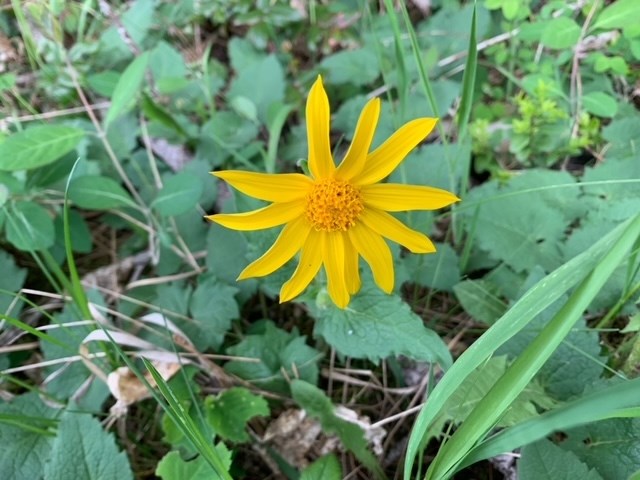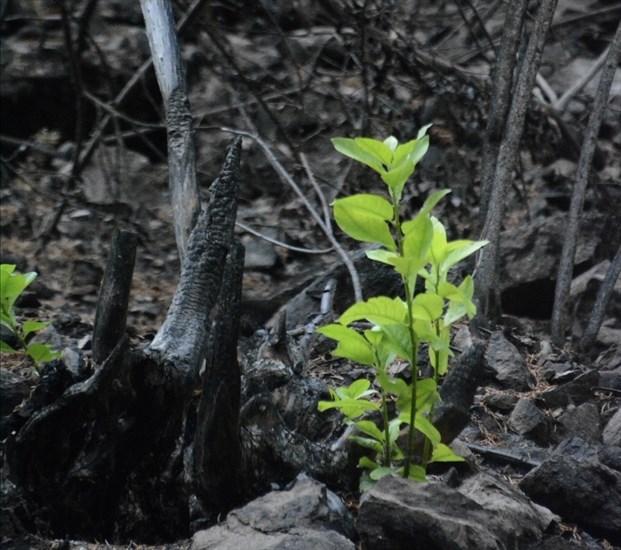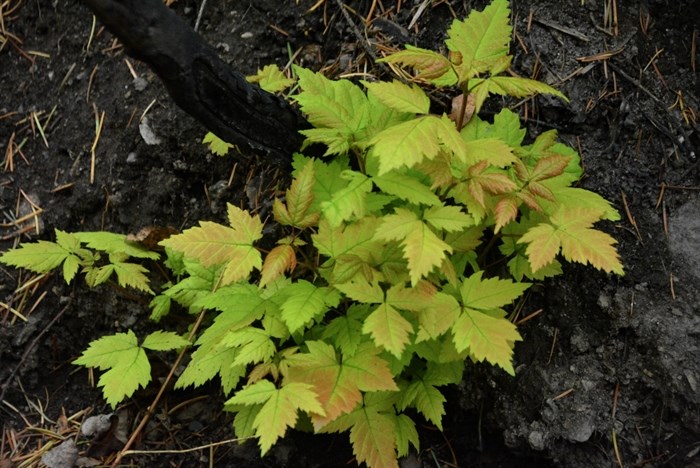
FILE PHOTO - Arnica flowers are wild perennials which pop up around May in the Okanagan.
(CHARLOTTE HELSTON / iNFOnews.ca)
March 24, 2024 - 8:00 AM
Spring in the valley is often accompanied by a yellow sea of Okanagan sunflowers. But after the devastating wildfires last summer, can residents expect to see the return of some of the regions most recognizable wildflowers?
Ian Walker, professor of Biology, Earth, Environmental and Geographic Sciences at UBC Okanagan, says he has already observed some flowers sprouting on Knox Mountain in Kelowna.
READ MORE: 'The land will be lost forever:' Okanagan is one the most endangered ecosystems in Canada
“Not so much in the centre of the burned area but where it was fairly lightly burned there were a fair number of little wildflowers coming up,” Walker told iNFOnews.ca.
Small spring flowering annuals like common whitlowgrass and blue-eyed Mary are making appearances on the mountain.

A willow shoot growing out of the charred soil left by the McDougall Creek Wildfire.
Image Credit: SUBMITTED/ Ian Walker
Perennial plants also survived the fires thanks to their deep roots as well as bitterroot, which Walker said is starting to show its spring leaves.
Unfortunately, he has yet to see any evidence of Arrowleaf Balsamroot (Okanagan sunflowers) regenerating.
“(Arrowleaf Balsamroot) tends to grow where there's a little bit more organic matter and so it may have burned a little hotter just where it happened to be.”
READ MORE: It's not all bad news for critters displaced by West Kelowna wildfire
According to Walker, plant recovery will be patchy across the burned areas. Particularly in the aftermath of the McDougall Creek wildfire on the westside of Okanagan Lake.
“There'll be some areas that are going to take maybe three years before it starts to be revegetated to any significant degree," he said.
In the fall, Walker examined the burned remains around the Rose Valley Reservoir Road.
“Some of the shrubs were already putting up fresh shoots,” he said. “I could see at the base of some of the Saskatoons and some of the willows and Douglas maple, that they were already starting to put up fresh shoots.”

New shoots and leaves growing at the charred base of a Douglas maple on Rose Valley Reservoir Road.
Image Credit: SUBMITTED/ Ian Walker
Different varieties of trees have also uniquely adapted to fire.
Ponderosa pine and Douglas fir, with their thick bark, can withstand ground fires. Whereas species of trees that typically grow at higher elevations, where fires are less frequent like spruce and fir, are more easily destroyed.
The lower elevations of Knox Mountain and the Westside are home almost entirely by Douglas fir and ponderosa pine.
READ MORE: Ministry investigating complaints about hundreds of trees felled after West Kelowna wildfire
However, with climate change and more frequent fires, these hardy trees are likely going to migrate up the mountains for a better chance at survival.
“It wouldn't be surprising to start seeing an upward shift," Walker said. "Places where there was spruce growing, for example, maybe the next generation (will be) more Douglas fir or some ponderosa pine.
“And some of the places where the ponderosa pine or Douglas fir that were killed further down, may never come back as forest. It may come back just as grassland.”
To contact a reporter for this story, email Georgina Whitehouse or call 250-864-7494 or email the editor. You can also submit photos, videos or news tips to the newsroom and be entered to win a monthly prize draw.
We welcome your comments and opinions on our stories but play nice. We won't censor or delete comments unless they contain off-topic statements or links, unnecessary vulgarity, false facts, spam or obviously fake profiles. If you have any concerns about what you see in comments, email the editor in the link above. SUBSCRIBE to our awesome newsletter here.
News from © iNFOnews, 2024